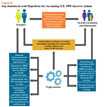Understanding HPV Coverage
The latest HPV vaccination coverage estimates in the 2016 National Immunization Survey-Teen show that most parents are choosing to get the HPV vaccine for their child. In 2016, 60 percent of teens aged 13-17 years received one or more doses of HPV vaccine, an increase of 4 percentage points from 2015.
Although most children are getting their first dose of HPV vaccine, many children are not completing the vaccination series. Only 43 percent of teens are up to date on all the recommended doses of HPV vaccine. Recent changes to HPV vaccine recommendations mean preventing HPV cancers is easier now than ever before: CDC recommends 11 to 12 year olds get just two doses of HPV vaccine to prevent HPV cancers. CDC urges providers to recommend HPV vaccination for all their 11- and 12-year-old patients on the same day and in the same way they recommend other preteen vaccines.
TeenVaxView is designed to help you access survey data collected by CDC and translate the data into action. This data can help you identify where additional efforts are needed to increase vaccination coverage.
The NIS-Teen provides national, state, and selected local area estimates of vaccination coverage, including new vaccines as they are licensed and recommended for use.
The President’s Cancer Panel has released a report calling for a coordinated effort to increase rates of vaccination against human papillomavirus (HPV).
Healthy People 2020 goals for immunization and infectious diseases are rooted in evidence-based clinical and community activities and services for the prevention and treatment of infectious diseases.
Community Preventive Services Task Force Recommendations and Findings on Increasing Appropriate Vaccination lists interventions reviewed by the Community Guide, with a summary of the Task Force finding.
- Page last reviewed: November 15, 2016
- Page last updated: August 24, 2017
- Content source:


 ShareCompartir
ShareCompartir




